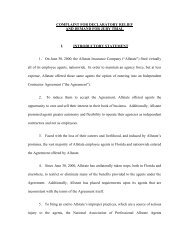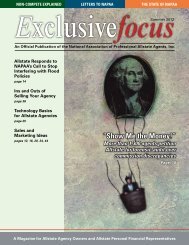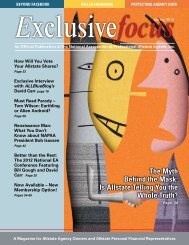EF Fall 07.indd - National Association of Professional Allstate ...
EF Fall 07.indd - National Association of Professional Allstate ...
EF Fall 07.indd - National Association of Professional Allstate ...
Create successful ePaper yourself
Turn your PDF publications into a flip-book with our unique Google optimized e-Paper software.
featureIs the Grass Really Greeneron the Other Side?Insurance agents are constantly facedwith the dilemma <strong>of</strong> whether or not it isbetter to become an independent agentor a captive agent. Indeed, there aresome major differences between thesetwo agent types. If all you had to do iscompare Miriam Webster’s definitions <strong>of</strong>the words “captive” and “independent”it would be easy to define yourself andyour business. Webster defines the word“captive” as being “kept within bounds:confined, held under control <strong>of</strong> anotherbut having the appearance <strong>of</strong> independence;being taken and held or under thecontrol <strong>of</strong> others or as a prisoner.” Theword “independent” as defined by Websteris “not subject to control by others:self-governing, not affiliated with a largercontrolling unit.” Now, if it were thatsimple, it would make for an easy choicebetween the two options.Naturally, one <strong>of</strong> the reasons for becomingan independent agent is to workin an environment free <strong>of</strong> the control <strong>of</strong>others. Once the decision is made, however,some agents are surprised by howindependent they really are. They soonrealize that, more <strong>of</strong>ten than not, theyare truly on their own. While they enjoythe freedom making their own businessdecisions, independent agents do notreceive the support and assistance suchas training, marketing, business support,name recognition, economies <strong>of</strong> scale,and other amenities that are <strong>of</strong>ten providedby some captive carriers. In addition,it is important to note that independentagents are still at the mercy <strong>of</strong> thecarriers with whom they hold contracts.These contracts can generally be terminatedat any time without cause. A largepercentage <strong>of</strong> captive agents think that,by going independent, they’ll have accessto dozens <strong>of</strong> carriers. This is simply notthe case, especially for scratch agencies.This is because the carriers require premiumcommitments.While the grass looks greener forcaptives looking over at the independentside, there are some definite advantagesto the captive side that should not beoverlooked. In most instances, captivesenjoy tremendous brand recognition andnational advertising campaigns. Consumersrecognize brand names such as<strong>Allstate</strong> and State Farm and when theydo think about shopping for insurance,these are the names that come to mindfirst. Captive agents also have access t<strong>of</strong>ree national marketing and advertisingmaterials. In addition, some companieshave marketing specialists who can assistwith more specific local campaigns.There is also something to be said aboutthe ease <strong>of</strong> doing business when you’re acaptive agent. Instead <strong>of</strong> a dozen or moresets <strong>of</strong> underwriting rules and guidelinesthat independent agents need to be familiarwith, captives operate <strong>of</strong>f a singleset. Captives also usually enjoy the luxuries<strong>of</strong> computer support, peer groupsand extensive training for both new andseasoned agents.On the other hand, captives have ahost <strong>of</strong> special problems that cannot beignored. Agents representing only onecarrier are at the mercy <strong>of</strong> the companythey represent. As an example, when<strong>Allstate</strong> discontinued earthquake coverageand pulled out <strong>of</strong> property marketsfrom coast to coast, agents were severelyaffected by the loss <strong>of</strong> new business andrenewal defections. To its credit, thecompany has made efforts to find othercarriers to fill the void, but agent commissionsare significantly lower and thedecision to abandon markets has rankledconsumers and regulators.In the final analysis, agents, regulatorsand consumers will come to realize thatinsurance is a business and businessesmust act in their own best interests tosurvive. The bottom line is that agents,both captive and independent, are simplypawns in the game <strong>of</strong> insurance. The differenceis that agents on the independentside typically have other carriers to providethe necessary coverage.Other disadvantages <strong>of</strong> the captivesystem include the fact that agents areonly able to <strong>of</strong>fer one menu <strong>of</strong> products.If a prospect doesn’t qualify or hasspecial needs, there is usually nothinga captive can do except walk the business,usually to an independent agent.Depending on the company and localmarkets, captive agents can lose up to90% <strong>of</strong> the prospects who contact themfor insurance. It’s a fact that many captiveagents have developed relationshipswith independent agents who helpplace the business that the captive can’twrite. In spite <strong>of</strong> their dismal closingratio, many aggressive captive agentsspend thousands <strong>of</strong> advertising dollarsto generate more quotes, which meanssending a ton more referrals to their independentagent brethren. Sounds likea good advertising plan if you’re an independentagent!16 — Exclusivefocus <strong>Fall</strong> 2007
















